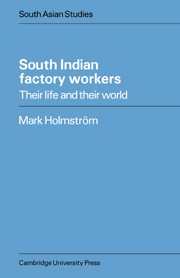Summary
This chapter is about individuals: some of the workers who gave up their evenings and Sundays to tell me their life stories, to answer questions and to ask about my work and country and opinions. This kind of fieldwork is and ought to be an exchange of information, in which the fieldworker may have to answer almost as many questions as he asks. This is so particularly when one is under the obligations of a guest, as I was: sitting in my informant's house, introduced by his friends, drinking the coffee and eating the snacks his wife had made for me, and taking up his free time.
Much of my time was spent looking for people: getting introductions to potential informants (especially those who would fill gaps in my sample and make it more representative) and travelling all over the city to contact workers from my four factories, whose addresses I had collected at casual meetings around the factory or in the company of friends; and then going from one address to another, hoping to find someone in at a time when it was convenient for him to talk to me, making appointments for further visits, and getting into conversation with local people who were curious about my work – often workers who had seen me around their factory. I used no technical aids like tape recorders or cameras, but preferred to travel light, carrying only a pen and paper in my pocket, to summarize interviews and sometimes to take down important passages verbatim.
- Type
- Chapter
- Information
- South Indian Factory WorkersTheir Life and their World, pp. 86 - 121Publisher: Cambridge University PressPrint publication year: 1976

